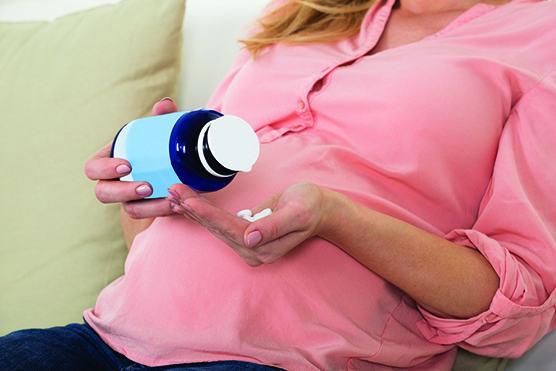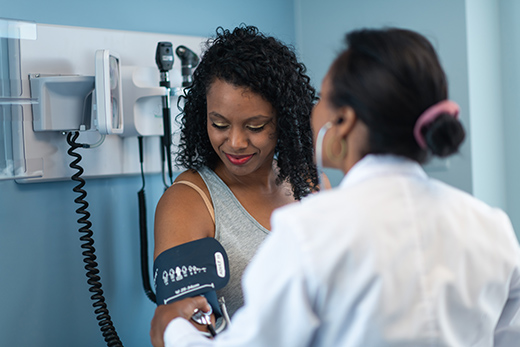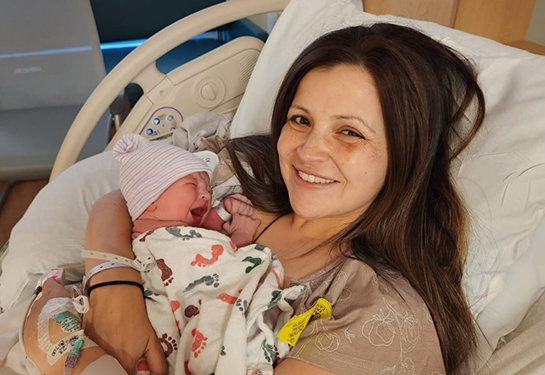Pregnancy Health and Nutrition
We offer nutrition counseling services to expecting mothers to ensure proper nutrition during pregnancy and help unborn babies develop properly in the womb.
Medically reviewed on July 12, 2023.

Healthy Eating During Pregnancy
What you eat during pregnancy affects your health and the health of your unborn baby. Moms-to-be have unique nutritional needs. A healthy diet helps unborn babies grow as they should.
At UC Davis Health, our OB-GYNs and registered dietitians (RDs) work together to ensure you get proper nutrition for a healthy pregnancy. You receive expert care from our OB-GYN program, which U.S. News & World Report rates among the top 25 in the nation.
Pregnancy Nutrition Services
Registered dietitians at UC Davis Health Food and Nutrition Services provide dietary advice at our outpatient clinics, primary care offices and UC Davis Medical Center. Our experts ensure you get the vitamins and nutrients you and your unborn child need to grow and thrive.
Calcium
Calcium strengthens your baby’s bones and teeth. You need about 1,000 milligrams (mg) of calcium every day. In addition to dairy products, you can get calcium from fortified foods, broccoli, almonds, tofu and green leafy vegetables.
Choline
Choline helps your baby’s brain develop and lowers the risk of certain birth anomalies. To get the recommended 450 mg of choline every day, eat more beef, chicken, eggs, milk, peanuts and soy products.
Folic Acid
Folic acid is a B vitamin that helps prevent neural tube anomalies like spina bifida as a baby forms in your womb. Pregnant women need 600 micrograms (mcg) of folic acid every day. Folic acid is in fortified cereals, breads and orange juice, as well as leafy vegetables. To get the recommended amount, you should take a prenatal vitamin as recommended by your OB-GYN.
Iron
You need 27 mg of iron every day to help your body make the extra blood it needs during pregnancy. You should eat more iron-rich foods like fortified cereals, beef, turkey, tofu, beans and lentils.
Omega-3 Fatty Acids
Omega-3 fatty acids, found in fish, flaxseed, chia seeds, and walnuts aid your baby’s brain development. Pregnant women can safely eat two to three 4-ounce servings of low-mercury fish each week. Good sources include salmon, shrimp, seabass and tilapia.
Vitamin B
B vitamins are essential for your baby’s eyesight. These vitamins also keep the placenta healthy. Foods high in vitamin B include pork, chicken, eggs, nutritional yeast, beans and whole-grain products.
Vitamin C
Vitamin C gives your immune system a boost so you’re less likely to get sick during pregnancy. It also helps your baby develop strong muscles and bones. Pregnant women need 85 mg of vitamin C every day. Good sources include strawberries, citrus fruits and juices, broccoli and tomatoes.
Vitamin D
Vitamin D and calcium work together to build a baby’s bones and teeth. You need 600 international units (IUs) of vitamin D every day. Choose fortified dairy products and cereals, egg yolks and fatty fish like salmon. Also included are plant-based milks such as oat, almond and soy milks.
Request an Appointment
As Sacramento's No. 1 hospital, you'll benefit from unique advantages in primary care and specialty care. This includes prevention, diagnosis and treatment options from experts in 150 specialties.
Referring Physicians
To refer a patient, submit an electronic referral form or call.
800-4-UCDAVIS
Patients
Call to make an appointment.
Consumer Resource Center
800-2-UCDAVIS
Some conditions may require you to follow a special dietary plan during pregnancy. You may need nutrition counseling services if you have:
-

Gestational Diabetes
Gestational diabetes occurs when your blood sugar levels get too high during pregnancy. Our dietitians can customize a dietary plan that has the right amounts of carbohydrates, grains, protein, fruits and vegetables. This dietary plan will also reduce how much sugar you eat.
-

High Blood Pressure and Preeclampsia
High blood pressure during pregnancy can lead to a condition called preeclampsia. These conditions can slow blood flow to your unborn baby, leading to a low birthweight or early birth. Preeclampsia also puts you at risk for seizures and liver and kidney problems. Our dietitians develop dietary plans that protect you and your unborn baby. You may need to eat more fresh fruits and vegetables while consuming less sodium, caffeine and fried foods.
-

Dietary Restrictions
Certain dietary restrictions can make it harder to get the nutrients you need during pregnancy. Our dietitians can help if your diet is limited due to conditions like celiac disease or a vegetarian diet.
Foods to Avoid During Pregnancy
You should avoid or cut back on certain foods and drinks that may cause pregnancy complications or harm your developing baby.
Alcohol
Alcohol can affect an unborn baby’s growth, leading to birth anomalies and developmental disabilities. Too much alcohol during pregnancy can cause fetal alcohol spectrum disorders. Alcohol use while pregnant also increases the risk of miscarriage, stillbirth and preterm birth. There is no safe amount of alcohol during pregnancy, so it’s recommended to avoid.
Caffeine
Caffeine can raise your blood pressure and may increase your risk of pregnancy complications. You should limit caffeine from beverages like coffee, tea and sodas to no more than 200 mg a day. That is equal to a 12-ounce cup of coffee.
Fish High in Mercury
High mercury levels found in certain fish can affect your unborn baby’s brain, hearing and vision. Pregnant women shouldn’t eat certain types of fish, such as swordfish, king mackerel and orange roughy. You should also limit white (albacore) tuna to 4 ounces per week.
"Advice About Eating Fish," U.S. Food and Drug Administration (FDA), https://www.fda.gov/media/102331/download
"Health Tips for Pregnant Women," National Institutes of Health (NIH), https://www.niddk.nih.gov/health-information/weight-management/healthy-eating-physical-activity-for-life/health-tips-for-pregnant-women?dkrd=/health-information/weight-management/health-tips-pregnant-women
"Alcohol Use During Pregnancy," Centers for Disease Control and Prevention (CDC), https://www.cdc.gov/ncbddd/fasd/alcohol-use.html

Ranked among the nation’s best hospitals
A U.S. News & World Report best hospital in cardiology, heart & vascular surgery, diabetes & endocrinology, ENT, geriatrics, neurology & neurosurgery, and pulmonology & lung surgery.

Ranked among the nation’s best children’s hospitals
U.S. News & World Report ranked UC Davis Children’s Hospital among the best in neonatology, nephrology, orthopedics*, pediatric & adolescent behavioral health, and pulmonology & lung surgery. (*Together with Shriners Children’s Northern California)

Ranked Sacramento’s #1 hospital
Ranked Sacramento’s #1 hospital by U.S. News, and high-performing in aortic valve surgery, back surgery (spinal fusion), COPD, colon cancer surgery, diabetes, gynecological cancer surgery, heart arrhythmia, heart failure, kidney failure, leukemia, lymphoma & myeloma, lung cancer surgery, pacemaker implantation, pneumonia, prostate cancer surgery, stroke, TAVR, cancer, orthopedics, gastroenterology & GI surgery, and urology.

The nation’s highest nursing honor
UC Davis Medical Center has received Magnet® recognition, the nation’s highest honor for nursing excellence.

World-class cancer care
One of ~59 U.S. cancer centers designated “comprehensive” by the National Cancer Institute.

A leader in health care equality
For the 13th consecutive year, UC Davis Medical Center has been recognized as an LGBTQ+ Healthcare Equality Leader by the educational arm of America’s largest civil rights organization.

